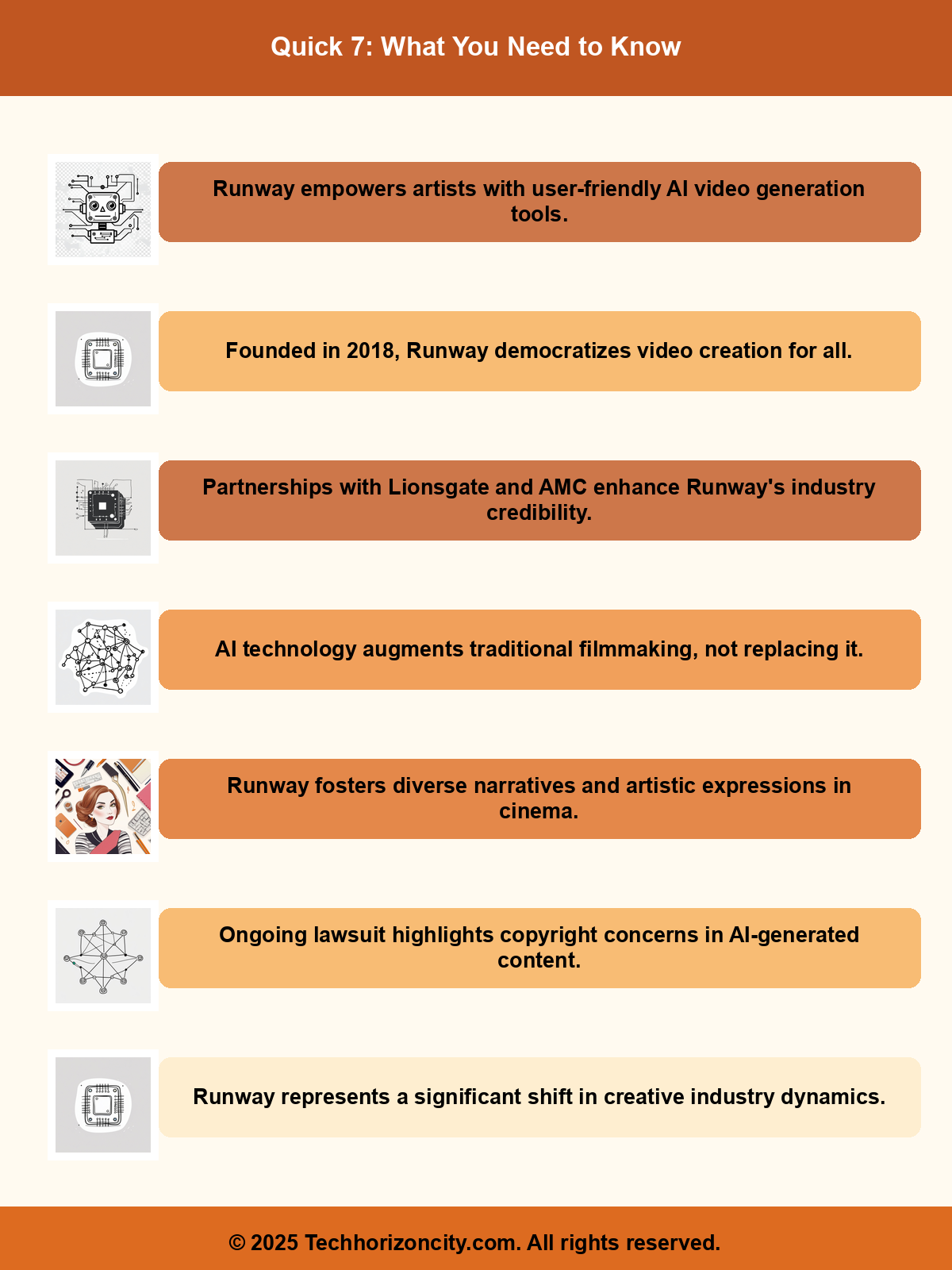Executive Summary
Runway, an innovative AI video generation platform founded in 2018 by Cris Valenzuela, is making waves in the creative industry. By streamlining the video creation process through user-friendly interfaces, Runway empowers artists to bring their visions to life with ease. While it has garnered partnerships with industry giants such as Lionsgate and AMC Networks, the platform finds itself at the center of a contentious debate over copyright issues related to the use of AI in creative fields. This blog post will explore Runway’s potential to enhance artistic expression, its implications for the film industry, and the ongoing challenges it faces as it navigates the complex landscape of intellectual property rights.

Background Context
Founded with the vision of democratizing video creation, Runway has positioned itself as a crucial player in the realm of generative media. The platform allows users to produce videos by starting with a reference image and inputting text prompts, enabling a seamless blend of technology and creativity. This approach caters to a diverse audience, from seasoned filmmakers to aspiring content creators, reflecting the growing demand for accessible tools in the artistic sphere.
Over the years, Runway has forged valuable partnerships with notable film studios, enhancing its credibility and reach within the industry. Such collaborations signal a recognition of AI’s potential to augment traditional filmmaking rather than completely overhaul it. Cris Valenzuela’s perspective on Runway emphasizes its role as an enabler of creativity, asserting that it should be viewed as a complementary tool rather than a disruptive force, which is a crucial distinction in the ongoing discourse surrounding AI and the arts.
Analysis of Implications
The emergence of AI platforms like Runway is undoubtedly transformative, yet it raises important questions about the nature of creativity itself. By allowing users to create content with minimal technical expertise, Runway democratizes filmmaking, making it accessible to a broader audience. This shift could lead to a surge in diverse narratives and artistic expressions, enriching the cinematic landscape.
However, the platform’s involvement in a class-action lawsuit, primarily focused on its training data sourced from copyrighted materials, highlights the contentious intersection of technology and intellectual property law. The allegations suggest that Runway may have utilized content from platforms like YouTube without sufficient consent, raising critical ethical and legal concerns that the entire industry must grapple with.
Industry Impact Assessment
As the film and creative industries continue to evolve, the implications of AI-driven tools like Runway extend far beyond individual filmmakers. The partnerships with major studios indicate a significant shift in how traditional media companies are beginning to embrace new technologies. This acceptance may lead to increased investment in AI solutions that enhance production efficiency, reduce costs, and foster innovative storytelling techniques.
Nevertheless, the potential for disruption looms large. While Runway enhances production capabilities, it also poses a threat to established roles within the industry. The ease of content creation may lead to an oversaturation of media, challenging the market’s ability to discern quality from volume. Moreover, as AI-generated content becomes increasingly sophisticated, the specter of creative authenticity may arise, forcing industry stakeholders to reconsider what constitutes originality.
Future Outlook
Looking ahead, the trajectory of Runway and similar platforms will depend heavily on how they navigate the evolving landscape of copyright law and public perception. As the legal framework surrounding AI and creative works becomes more defined, companies will need to prioritize ethical practices and transparency in their operations. Additionally, fostering a collaborative relationship with artists and content creators will be essential for maintaining credibility.
Furthermore, we may witness an expansion of AI applications in filmmaking beyond traditional video generation. Innovations such as real-time editing, personalized content creation, and enhanced visual effects could redefine what is possible in storytelling. As these technologies mature, they will likely inspire new genres and formats, blurring the lines between creators and audiences in unprecedented ways.
Conclusion with Key Takeaways
The advent of platforms like Runway marks a pivotal moment in the intersection of technology and artistic expression. While it serves as a gateway for creativity and innovation, the challenges of copyright and ethical considerations cannot be overlooked. As the industry adjusts to these changes, the collective response will shape the future of filmmaking and content creation. The key takeaways from this discussion include:
- Runway exemplifies the potential for AI to democratize creative processes, making filmmaking more accessible.
- The platform’s legal challenges underscore the need for clearer regulations surrounding the use of AI in creative industries.
- Collaboration between technology providers and industry stakeholders will be vital for sustainable growth and innovation.
- The future of content creation will likely see AI playing an increasingly prominent role, prompting reevaluations of artistic authenticity and quality.
Ultimately, how the creative community embraces these technologies will determine the next chapter in the evolution of storytelling.
Disclaimer: This article was independently created based on publicly available information and industry analysis. While inspired by developments reported at www.theverge.com, all content, analysis, and opinions expressed are original and do not reproduce copyrighted material.
For the original reporting, please visit: https://www.theverge.com/decoder-podcast-with-nilay-patel/679312/runway-ceo-cris-valenzuela-ai-video-copyright-hollywood-film-youtube
